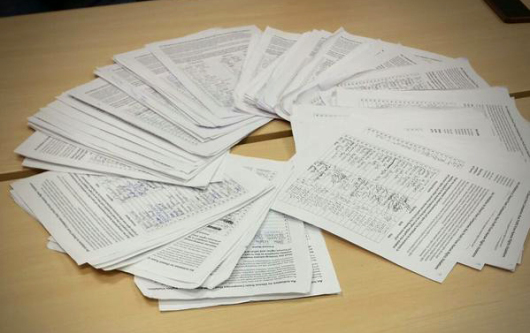
The organization OSU Divest collected over 3,000 signatures to bring forth Issue 1 to the ballot. Credit: Courtesy of OSU Divest
Although Issue 1 didn’t get placed on the ballot for the 2015 Undergraduate Student Government election, Ohio State students might have the chance to vote on the issue in a special election later this month.
The USG Judicial Panel announced on Wednesday in a press release that the vote will take place from March 30 through April 1, pending approval from the USG General Assembly.
“To ensure fairness and student representation in this case, the Judicial Panel is instituting a special election as the only body charged with handling the entirety of undergraduate student elections,” the Judical Panel said in the release.
“We call upon the rest of USG, namely the General Assembly, to approve the issuance of a special election. We also call upon President Celia Wright and Vice President Leah Lacure (who have expressed their concerns about OSU Divest’s voice being blocked) to aid us in the assurance of fairness and integrity of elections and allow OSU Divest the chance to express their student voice via the special election on Issue (1).”
Issue 1 was brought forth by a petition from the organization OSU Divest, and asked whether student voters thought OSU should divest — or cut financial ties — from companies “complicit in Israeli human rights violations and the occupation of the Palestinian Territories,” according to the OSU Divest website.
Cruz Bonlarron Martínez, a fourth-year in geography and publicity director at the OSU Committee for Justice in Palestine, said in an email that OSU Divest, USG and the USG Judicial Panel had engaged in discussions following the Judicial Panel’s decision on Sunday to deny Issue 1 a spot on the USG ballot.
A rally was held in front of the Ohio Union prior to the Judicial Panel’s decision to create a special election on Wednesday, and was attended by approximately 40 people.
At the rally, organized by OSU Divest, students delivered speeches and shared their feelings on the subject.
The speeches touched on the apartheid that occurred in South Africa from 1948 through 1994, drawing parallels to the current events occurring in Israel and Palestine.
In the Wednesday release, the Judicial Panel defended its initial decision to deny Issue 1 a spot on the ballot because the petition failed to meet certain submission criteria outlined in the USG election bylaws.
“In the recent events surrounding the issue of Clerk vs. OSU Divest, we ruled in accordance with the USG election bylaws in that the lack of circulation signatures on OSU Divest’s petition entitled ‘Issue 1’ invalidated the overwhelming majority of their petition pages and determined that Issue 1 would not be on this year’s election ballot,” the release said.
According to USG’s Judicial Panel, for a petition to be valid, it must have the name of the circulator on every page. The petition from OSU Divest failed to have the name on all the pages, the panel said, so the pages without the name were thrown out.
The panel said the invalidity of the pages did not leave a “sufficient amount of signatures” for the petition to appear on the ballot, and added that had the name appeared on every page, the issue would have been included on the ballot.
Some students at the rally did not think this was a valid reason to disqualify the issue from appearing on the ballot.
“It wasn’t really grounds to disqualify them,” Akela Jennings, a fourth-year in public affairs and a member of OSU Divest said in reference to the ruling. “If anything, we could have had a fine or something like that. I feel like they might not have been trying to treat us unfairly, but the treatment was definitely going to stifle student voice.”
In the release, the Judicial Panel acknowledged “the presence of procedural error in the handling of this case,” specifically pointing out that the hearing to determine the validity of Issue 1 was held the day before USG elections began and that the petition was confirmed without the presence of a circulator spot on the page.
“Given that the panel is responsible for maintaining fair elections, the Judicial Panel feels that the procedural errors in this case were unjust,” the release said.
Vidar Thorsteinsson, a volunteer with OSU Divest who attended the rally, seemed confident that the issue will reappear later this year, even before the announcement was made.
“I think there’s no way that USG and the university would not let students have a legitimate vote on an issue like that, because there’s a very strong impetus behind this,” said Thorsteinsson, a fifth-year in a Ph.D. program in comparative studies. “We collected a lot of signatures, 3,000 students voices came out and said they want to have this issue voted on.”


